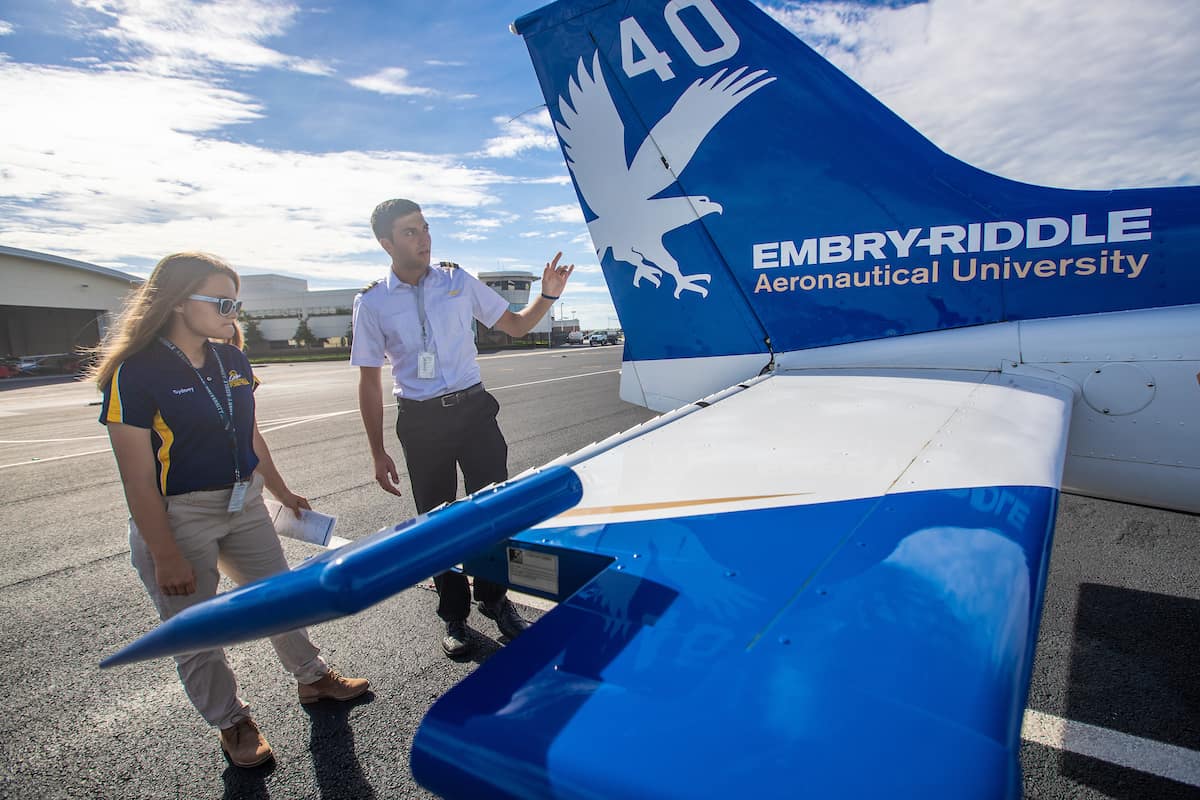Embry-Riddle’s Daytona Beach Campus to Train Student Pilots Faster, Better, at Lower Cost

With demand for airline travel rebounding sharply and the global pilot shortage back to pre-pandemic levels, aviation leader Embry-Riddle Aeronautical University today announced an innovative plan to train student pilots faster and more effectively, at lower cost.
Faced with heavy demand for its highly regarded Aeronautical Science degree program, Embry-Riddle’s Daytona Beach Campus has developed an evidence-based approach to flight training that will allow student pilots to save time and money.
Under the plan, all first-year students enrolled for the fall 2021 semester on Embry-Riddle’s Daytona Beach Campus will begin hands-on flight training by mid-spring 2022. To improve flight readiness so that time in the air is well spent, students will first complete routine, compulsory requirements in virtual reality (VR) environments in newly acquired, dedicated software and hardware platforms.
“The predictability of progress in flight training will be enhanced and the total number of hours required to train each student will be reduced,” said Dr. Alan Stolzer, dean of the College of Aviation on Embry-Riddle’s Daytona Beach Campus. “Just as importantly, the successful implementation of this strategy will result in an increased training capacity, which will help to ensure that most, if not all, first-year students commence their private pilot flight training by no later than the spring semester.”
The new plan also promotes Embry-Riddle’s No. 1 priority – aviation safety – because students will be well-prepared for flight before they ever climb into a training aircraft, said University President Dr. P. Barry Butler.
“The popularity of our flight program reflects the exceptional quality of the education that we are providing to our students, and the abundance of high-paying jobs in the aviation industry,” Butler added. “Embry-Riddle is working to both uphold the highest possible standards of aviation safety and deliver high-value degrees to our graduates.”
More Efficient, Cost-Effective Training
Embry-Riddle, home to the world’s most advanced collegiate aviation simulation center, will leverage cutting-edge technology to help first-year students become familiar with the aircraft they will fly; the preflight and operational procedures for the aircraft; and the protocols for communication with air traffic control, under the new plan.
Specifically, Stolzer explained, this four-week readiness program will include daily activities in Embry-Riddle’s Frasca level 6 Flight Training Devices. “These devices provide a high-fidelity experience that match the flight deck and flight characteristics of Embry-Riddle training aircraft,” said Dr. Ken Byrnes, chair of the Flight Department and assistant dean of the Daytona Beach Campus College of Aviation. “In addition, students will receive daily one-on-one knowledge instruction with their flight instructor.”
All of these activities will be enhanced and reinforced by completion of the VR training.
Embry-Riddle’s new approach to flight training will allow students to practice in virtual reality (VR) devices using interactive, state-of-the-art simulation software. In the U.S. Air Force Pilot Training Next program, the use of VR tools was shown to improve student learning and reduce training time, Stolzer noted. In this way, students will complete 20 hours of guided flight training in a VR simulator, which supports training and repetitive practice sessions.
“As educators at True Course Simulations, we started working on a virtual reality simulation learning system to find a solution to reducing costs and training time," said Ray Bedard, founder of True Course Simulations, the company that provides the VR environments. "As Embry-Riddle has shown, our system can reduce time to solo in the private pilot curriculum significantly, as students learn and practice procedures in a more conducive learning environment that translates directly to the aircraft.”
VR technology, along with intensive one-on-one mentoring, will be used to help new flight students understand and gain proficiency with radio transmissions. Ten hours of training will be provided in an air traffic control simulator application. Daily homework will be completed using a Pre-Activity Computer Exercises system.
Following successful completion of this first phase of their training, students will transition to hands-on flight training in aircraft. “Students will be fully prepared for training in the aircraft, which will allow them to perform at a higher level with a deeper understanding of every aspect required for primary flight training,” Byrnes said. “In addition, students will be scheduled in aircraft more frequently, which will allow them to maintain a high level of proficiency. Ultimately, students will complete their flight training faster and at a lower cost in this program.”
Students completing flight training with Embry-Riddle can expect outstanding job prospects: Exceptionally high demand for Embry-Riddle’s flight-training program relates to the global shortage of pilots and aviation maintenance technicians – a problem that is real and growing. The Boeing Company’s Pilot & Technician Outlook 2020-2039 projects that 763,000 new civil aviation pilots and 739,000 new maintenance technicians will be needed to fly and maintain the world fleet within about the next 20 years.
